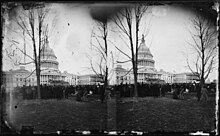James Noble Tyner
This article may require Godlove Orth | |
| Succeeded by | Morton C. Hunter |
|---|---|
| Personal details | |
| Born | James Noble Tyner January 17, 1826 Brookville, Indiana, U.S. |
| Died | December 5, 1904 (aged 78) Washington, D.C., U.S. |
| Political party | Republican |
James Noble Tyner (January 17, 1826 – December 5, 1904) was a
Early life and family

James Noble Tyner was born in
Political career
From 1857 to 1861, Tyner was secretary of the Indiana Senate. In 1860, he served as a Republican presidential elector and cast his ballot for Abraham Lincoln and Hannibal Hamlin. From 1861 to 1866, Tyner was a special agent for the United States Post Office Department.[2]
U.S. Representative (1869–1875)
In 1869, Tyner was elected to the United States House of Representatives to fill the vacancy caused when Representative-elect Daniel D. Pratt resigned after winning a seat in the United States Senate.[2] Tyner represented Indiana's 8th District during the 41st, 42nd, and 43rd U.S. Congresses, March 4, 1869, to March 3, 1875.[2] Tyner, considered a reformer in his first two terms, gave few speeches in the House and was noted for his statistical accuracy and "sound reasoning".[5][6] After Congress passed the unpopular 1873 Salary Grab Act, many members lost their seats, and Tyner was among those who lost his party's nomination for reelection in 1874.[7]
Advocated repeal of franking privilege
On February 5, 1870, Tyner made his first House speech, in which he advocated for ending the Congressional Franking Privilege.[5] President Grant's Postmaster General John Creswell also advocated the end of franking, but efforts to eliminate it failed, and members of the U.S. House and U.S. Senate continued to send franked mail for free.
Opposition to railroad subsidies
Tyner spoke against granting large land subsidies to the

Salary Grab Act
On March 3, 1873, Grant signed a bill into law that increased the President's pay from $25,000 to $50,000, raised Congressional salaries from $5,000 to $7,500, and included a $5,000 bonus for House and Senate members. Tyner voted for the bill, which came to be known as the Salary Grab Act. Newspapers widely publicized the $5,000 bonus, and the bill was repealed in January 1874, though the president's salary raise remained in effect. The unpopularity of the Salary Grab led to many members of Congress losing their seats, and Tyner lost the Republican nomination when he ran for reelection in 1874.[7]
Committees served on

- 41st Congress (1869–1871)
- 42nd Congress(1871–1873)
- 43rd Congress (1873–1875)
- House Appropriations 3rd-Majority.[8]
Second assistant Postmaster General (1875–1876)
In February 1875, Grant appointed Tyner as Second Assistant U.S. Postmaster General, serving under Postmaster General Marshall Jewell and First Assistant Postmaster General James William Marshall. He served from February 26, 1875, to July 12, 1876, when he was appointed as Jewell's successor.
Postmaster General (1876–1877)

On July 12, 1876, President Grant appointed Tyner Postmaster General, serving until March 12, 1877. Tyner secured his old position of Second Assistant Postmaster General to his fellow Indianan and Civil War general Thomas J. Brady appointed by President Grant. Brady would later be involved and associated with the Star Route postal scandal that was revealed after President James A. Garfield took office in 1881.
First assistant Postmaster General (1877–1881)

After the end of the Grant administration, he was appointed to First Assistant Postmaster General by President Rutherford B. Hayes, serving from 1877 until his resignation in October 1881. When President James A. Garfield took office on March 4, 1881, there were rumors of fraud in the postal department where corrupt contractors made excessive profits on Star Routes. President Garfield had ordered an investigation on the matter by his appointed Postmaster General Thomas L. James.[9] Tyner was extremely familiar with the inner workings of the postal contract system and upon investigation by Postmaster General James was assumed to have known and allowed postal contract profiteering. James ordered Tyner to resign office by July, but after Garfield was assassinated and incapacitated, Tyner refused to leave. Also involved in the Star Route frauds was Tyner's Indiana friend and Second Assistant Postmaster Thomas J. Brady.[9] The investigation revealed that Tyner had given his son a lucrative job of $2,000 a year as Superintendent of the Chicago Post Office. When his son took the position Tyner had increased his salary from $1,000 to $2,000. When Garfield finally died on September 19, and his Vice President Chester A. Arthur took office, President Arthur finally forced Tyner to resign and vacate office on October 17, 1881.[9]
Later career
On the evening of June 12, 1882, Tyner was seriously injured, suffering a concussion and bruising on his face after being thrown from a buggy while riding near Brightwood.[10] Tyner recovered after being taken to the city and his wounds were dressed.[10]
Tyner was a delegate to the International Postal Congress in Paris in 1878 and in Washington, D.C., in 1897. Tyner served as Assistant Attorney General of the Post Office Department from 1889 to 1893 and again from 1897 to 1903.
Post Office frauds and investigation (1903)
On March 7, 1903, President
On April 22, 1903, Assistant Attorney General Tyner was removed from office by Postmaster General Payne.[12] Four days later on April 26 Tyner and his wife denied any wrongdoing.[13] Tyner stated that he had served his country faithfully and the officials at the Post Office had "lost their heads".[13] Tyner stated he remained on as Assistant Attorney after March 9 to vindicate his honor.[13] Mrs. Tyner stated that she and her husband had been labeled robbers by the Postal Department.[13] Mrs. Tyner said that she had freely been allowed to go into Tyner's office room where the safe was located and nothing was done in secret.[13] Mrs. Tyner said she returned papers in a box to the Postal Department that did not have any criminal evidence.[13]
In mid-1903 Tyner was investigated for corruption in the Post Office by special prosecutor
Death
Since July, 1902, Tyner had been suffering from paralysis, and the postal investigation trial in 1904 had strained his feeble health.[15] He died in Washington, D.C., on December 5, 1904, and was interred there in Oak Hill Cemetery.[15]
Historical reputation
Tyner was the only member of the Grant Administration cabinet to hold a federal office appointment in the 20th Century serving under President William McKinley and President Theodore Roosevelt. He has been relatively forgotten by historians after 1906, having not been mentioned in the 1936 Dictionary of American Biography edited by Dumas Malone.[16] Elected three times to the House starting in 1869 Tyner was a successful mid-western politician, however, he was not reelected in 1874 due to his vote for the controversial Salary Grab Act. His long career in the Post Office Department was suspended in 1881 and finally ended in 1903 under suspicion of corruption. In 1903, Tyner and his wife's reputation was damaged after the controversy of taking official government documents from his office in Washington D.C. Tyner did not live long enough and was in feeble health to author and defend himself in a biography. Tyner was an expert on the inner workings of the Post Office during his lifetime, having a history of working for the Postal Department since 1861.
Notes
- ^ "JAMES N. TYNER (1876–1877)".
- ^ a b c d e f TBDOA 1906, p. 240.
- ^ a b Branigin 1913, p. 614.
- ^ Barnes 1874, p. 123.
- ^ a b c Barnes (1872), Republican Candidates In Indiana, p. 61
- ^ a b c d e f Barnes 1874, p. 124.
- ^ a b Smith 1925, p. 386.
- ^ a b c James Noble Tyner C-SPAN (2015)
- ^ a b c New York Times (October 18, 1881), General Tyner Requested to Resign
- ^ a b New York Times (June 14, 1882), Mr. Tyner Seriously Injured
- ^ a b c d Chambers-Woodward (1974), Responses of the Presidents to Charges of Presidential Misconduct, Theodore Roosevelt, p. 208
- ^ a b c d e f g h i j k New York Times (April 24, 1903), Wife Seizes Papers for James N. Tyner
- ^ a b c d e f New York Times (April 27, 1903) Tyners Deny Wrongdoing
- ^ a b c d e New York Times (November 30, 1903), The Postal Frauds
- ^ a b New York Times (December 6, 1904), James N Tyner Dead
- ^ Dictionary of American Biography (1936), edited by Dumas Malone, pages 101-102
Sources
- Barnes, William Horatio (1874). The American Government Biographies of Members of the House of Representatives of the Forty-Third Congress. New York: Nelson and Philips.
- Branigin, Elba L. (1913). History of Johnson County Indiana. Indianapolis: B.F. Bowen & Co., Inc.
- Rossiter Johnson, ed. (1906). The Biographical Dictionary of America. Boston: Boston, American Biographical Society.
- Smith, William Henry (1925). History of the Cabinet of the United States of America, from President Washington to President Coolidge. Baltimore, Maryland: The Industrial Printing Company.
External links
- United States Congress. "James Noble Tyner (id: T000452)". Biographical Directory of the United States Congress.
- James Noble Tyner at Find a Grave




